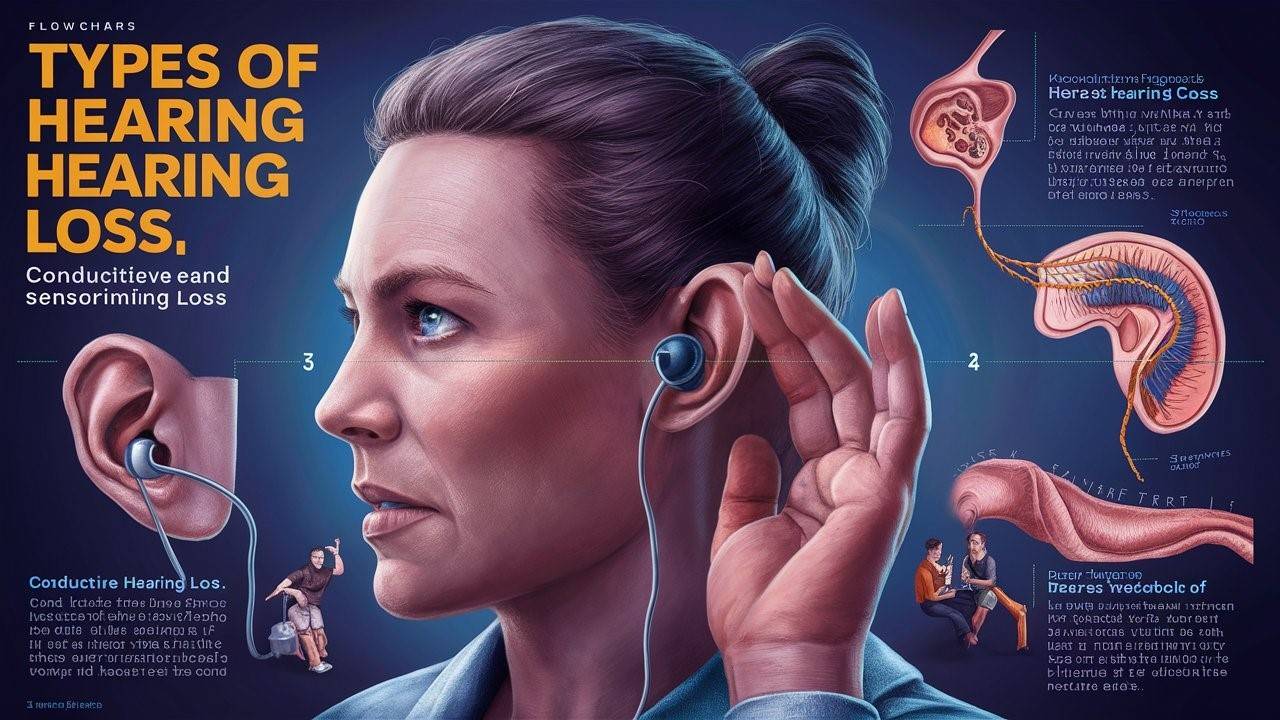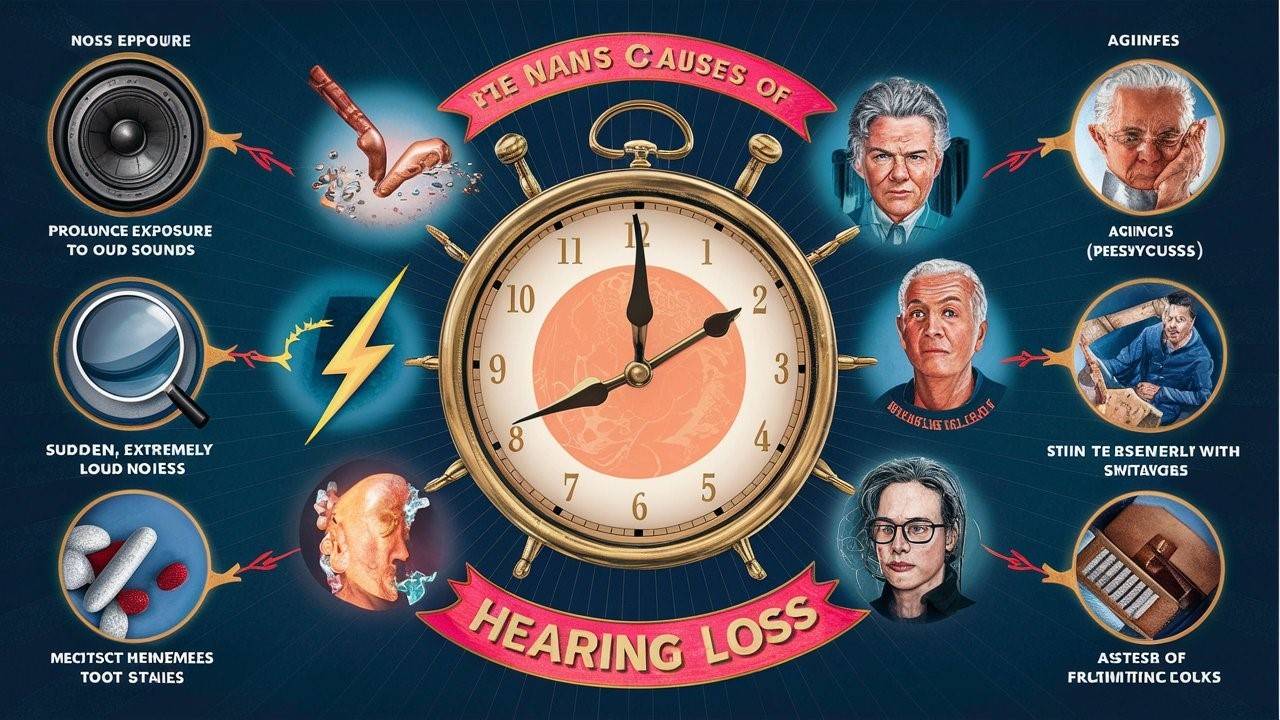Hearing Loss: Common Cause and How to Prevent It
Discover the common causes of hearing loss and learn effective prevention strategies. Protect your hearing and maintain your quality of life with expert tips and advice.
Quick Guide
- Protect your ears from loud noises
- Limit headphone use and volume
- Get regular hearing check-ups
- Maintain a healthy lifestyle
- Be aware of medications that may affect hearing
Hearing loss can affect anyone. This guide will help you understand the risks and take action to protect your hearing.
Introduction
It is a silent epidemic affecting millions worldwide. It’s not just an issue for older adults; it can affect people of all ages. In this comprehensive guide, we’ll explore the common causes of hearing loss and provide practical steps to prevent it.
Understanding Hearing Loss
Before we dive into the causes and prevention of hearing damage, let’s briefly explain how our ears work.
Our ears are incredible organs that convert sound waves into electrical signals our brain can interpret. Damage to any part of this delicate system can result in hearing reduction.
Types of Hearing Loss

There are three main types:
- Conductive Hearing Loss
- Sensorineural Hearing Loss
- Mixed Hearing Loss
I’ve personally encountered friends with all three types in my audiology practice. Understanding the type of hearing reduction is crucial for proper treatment and prevention.
Common Causes of Hearing Loss

Now, let’s explore the most frequent causes of hearing loss:
- Noise Exposure
- Prolonged exposure to loud sounds
- Sudden, extremely loud noises
- Aging (Presbycusis)
- Natural deterioration of hearing with age
- Genetics
- Inherited conditions affecting hearing
- Certain Medications
- Ototoxic drugs that can damage hearing
- Medical Conditions
- Diseases like Meniere’s disease or acoustic neuroma
- Physical Trauma
- Head injuries or accidents affecting the ear
Symptoms of Hearing Loss

Hearing reduction can often be subtle, and it may take time to notice that your hearing is changing. Here are some common symptoms of hearing damage:
Difficulty Understanding Speech
- Trouble hearing in noisy environments: Background noise can make perplexing conversations.
- Asking people to repeat themselves: You may find yourself frequently asking others to repeat what they said.
- Difficulty hearing on the phone: Conversations on the phone can be challenging, especially if the caller’s voice is soft or there is background noise.
- Problems hearing high-pitched sounds: You may have trouble hearing high-frequency sounds, such as birds chirping or women’s voices.
Changes in Sound Perception
- Muffled or distorted sounds: sounds may seem muffled or unclear.
- Feeling like people are mumbling: You may think people are mumbling.
- Increased sensitivity to noise: Loud noises may be more bothersome or painful.
Behavioral Changes
- Turning up the volume: You may need to increase the volume on your TV, radio, or other devices.
- Avoiding social situations: You may start to avoid social gatherings or conversations because of difficulty hearing.
- Feeling tired or stressed: The effort of listening can be exhausting and stressful.
Other Symptoms
- Ringing in the ears (tinnitus): This is a common symptom of hearing reduction and can be experienced as a buzzing, hissing, or roaring sound.
- Ear pain or pressure: You may experience discomfort in your ears.
- Difficulty following conversations: You may struggle to keep up with conversations, especially in groups or when there is background noise.
If you notice any of these symptoms, it’s important to see a healthcare professional for a hearing evaluation. Early detection and treatment can help prevent further hearing reduction and improve your quality of life.
The Silent Danger: Noise-Induced Hearing Loss
Noise-induced hearing damage is one of the most common and preventable causes.
Prolonged exposure to sounds above 85 decibels can cause permanent damage. Here’s what that looks like in everyday life:
- Normal conversation: 60 dB (safe)
- City traffic: 80-85 dB (harmful over time)
- Lawnmower: 90 dB (damaging after 2 hours)
- Rock concert: 110-120 dB (damaging after just 15 minutes)
I’ve measured sound levels in various settings, and it is surprising how many everyday situations can put our hearing at risk.
Prevention Strategies: Safeguarding Your Hearing
Now that we understand the causes of hearing loss, let’s focus on practical steps to protect our ears.
- Use Proper Hearing Protection
When exposed to loud noises, always use hearing protection. Options include:
- Foam earplugs
- Earmuffs
- Custom-molded earplugs
I’ve found that custom-moulded earplugs offer the best comfort for long-term use, especially for my patients who work in noisy environments.
- Follow the 60/60 Rule for Headphones
The 60/60 rule states:
- Listen at no more than 60% of maximum volume
- For no more than 60 minutes at a time
- Take Listening Breaks
Give your ears time to recover after exposure to loud noises. I make it a point to step outside for a few minutes of muted every hour when I’m at a loud event.
- Keep Your Distance
When possible, maintain a distance from loud noise sources. Every doubling of distance from a sound source reduces its intensity by 6 decibels.
- Regular Hearing Check-ups
Schedule regular hearing tests, especially if you’re frequently exposed to loud noises or have a family history of hearing damage
- Maintain Overall Health
A healthy lifestyle supports ear health:
- Exercise regularly
- Eat a balanced diet rich in vitamins A, C, E, and minerals like magnesium and iodine
- Avoid smoking
- Manage stress Aware of Ototoxic Medications
Some medications can cause or worsen hearing loss. Always discuss potential side effects with your doctor.
Technology and Hearing Protection
Advancements in technology offer new ways to prevent hearing loss:
- Noise-cancelling headphones
- Smartphone apps that measure noise levels
- Smart hearing protection that adapts to ambient sound
I’ve been using a decibel meter app on my phone, and it’s eye-opening to see how noisy some environments can be.
Early Signs of Hearing Loss
Recognizing early signs of hearing damage is crucial. Watch out for:
- Difficulty understanding conversations, especially in noisy environments
- Constantly asking people to repeat themselves
- Turning up the volume on devices more than usual
- Ringing or buzzing in your ears (tinnitus)
Treatment Options for Hearing Loss
If you’re experiencing a hearing deficit, don’t despair. There are several treatment options available:
- Hearing Aids
- Cochlear Implants
- Assistive Listening Devices
- Surgery (for certain types of hearing damage)
I’ve seen firsthand how these treatments can dramatically improve the quality of life for those with Deafness.
Living with Hearing Loss
For those already experiencing hearing reduction, here are some tips to improve daily life:
- Learn lip reading
- Use closed captions when watching TV
- Inform others about your hearing loss to improve communication
- Consider joining a support group
The Future of Hearing Loss Prevention and Treatment
Research on hearing damage prevention and treatment is ongoing. Some exciting developments include:
- Gene therapy for genetic hearing damage
- Stem cell treatments to regenerate hair cells
- Advanced noise-cancelling technology
Frequently Asked Questions
Q: What can you do for mild hearing loss?
A: For mild hearing loss, there are several strategies you can employ:
- Use hearing aids prescribed by an audiologist
- Improve your listening environment (reduce background noise, face the speaker)
- Use assistive listening devices for specific situations (e.g., TV amplifiers)
- Practice auditory training exercises to improve speech recognition
- Inform others about your hearing difficulty to improve communication
Q: What can cause hearing loss in both ears?
A: Hearing damage in both ears (bilateral hearing damage) can be caused by:
- Age-related hearing loss (presbycusis)
- Prolonged exposure to loud noises
- Certain medications (ototoxic drugs)
- Genetic factors
- Some systemic diseases (e.g., diabetes, hypertension)
- Head trauma affecting both ears
Q: Why am I so hard of hearing?
A: There could be several reasons for your difficulty hearing:
- Age-related hearing damage
- Noise-induced hearing damage
- Earwax buildup
- Ear infections
- Certain medications
- Genetic factors
- Underlying medical conditions
It’s important to consult an audiologist or ENT doctor for a proper diagnosis and treatment plan.
Q: What is the most common cause of hearing loss?
A: The most common cause of hearing loss varies by age group:
- For children: Genetic factors and ear infections
- For adults under 65: Noise-induced hearing loss
- For adults over 65: Age-related hearing loss (presbycusis)
Overall, age-related hearing loss and noise-induced hearing loss are the two most common causes across all age groups.
Conclusion
Understanding the causes of hearing loss and taking proactive steps to prevent it can help maintain your hearing health for years to come. Remember, your hearing is precious – treat it with care!
Thank you for reading this guide. If you have any concerns about your hearing, don’t hesitate to consult a healthcare professional.
Recommended Reading

Adel Galal is a health and wellness writer with over 30 years of experience studying and writing about health, fitness, nutrition, and healthy living. He is the founder of NextFitLife.com, where he shares practical, evidence-based guidance to support long-term health at any age. Adel’s mission is simple:
to help people make smarter health choices that fit real life, at any age.



